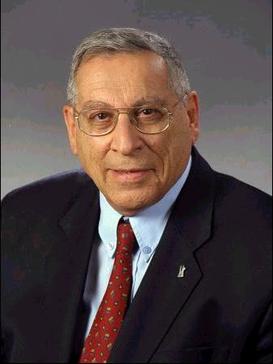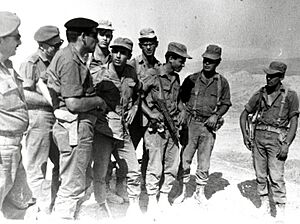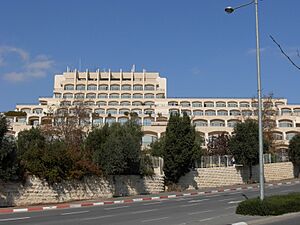Rehavam Ze'evi facts for kids
Quick facts for kids
Rehavam Ze'evi
|
|
|---|---|
 |
|
| Ministerial roles | |
| 1991–1992 | Minister without Portfolio |
| 2001 | Minister of Tourism |
| Faction represented in the Knesset | |
| 1988–1999 | Moledet |
| 1999–2001 | National Union |
| Personal details | |
| Born | 20 June 1926 Jerusalem, Mandatory Palestine |
| Died | 17 October 2001 (aged 75) Jerusalem |
Rehavam Ze'evi (Hebrew: רחבעם זאבי) was an important Israeli general and politician. He was born on June 20, 1926, and passed away on October 17, 2001. He started a political party called Moledet.
Ze'evi was sadly killed by members of a group called the Popular Front for the Liberation of Palestine (PFLP). This happened because they were reacting to Israel's actions against their leader, Abu Ali Mustafa.
Contents
About Rehavam Ze'evi
Rehavam Ze'evi was born in Jerusalem in 1926. His family had lived in Jerusalem for many generations. He grew up on a collective farm. In 1942, he joined a group called the Palmach, which was a fighting force. Later, he served in the Israel Defense Forces (IDF) after Israel became a country.
His Early Life and Nickname
When Ze'evi was young, he went to school in Givat HaShlosha. One night, he shaved his head and wrapped a towel around himself. He looked a bit like Mohandas Gandhi, so people started calling him "Gandhi." This nickname stayed with him for his whole life. He had five children: Palmach, Sayar, Masada, Tze'ela, and Arava.
His Military Adventures
In 1948, Rehavam Ze'evi was a leader in the IDF. From 1964 to 1968, he worked as the Chief of Staff in the Israeli army. In the late 1960s, Ze'evi created a special anti-terror unit called Sayeret Kharuv. He then became the Commander of the Central Military District for five years.
He retired from the army in September 1973. However, he rejoined when the Yom Kippur War started on October 6, 1973. He became a special helper to the Chief of Staff. He retired again in 1974 as a major-general.
Ze'evi cared deeply about Israeli soldiers who were captured or missing. He even wore a military tag with their names around his neck.
It was later shared that Ze'evi helped build the Singapore Armed Forces. In 1965, he secretly visited Singapore. He then sent a team of Israeli officers to help train and build up Singapore's army.
His Political Journey
In 1974, Ze'evi became an advisor to Prime Minister Yitzhak Rabin on fighting terrorism. The next year, he advised the prime minister on intelligence matters. He left this job in 1977.
In 1988, Ze'evi started the Moledet (Homeland) party. He believed in the idea of moving Arabs from the West Bank and Gaza Strip to neighboring Arab countries. In the election that year, he won a seat in the Knesset, which is Israel's parliament. He held this seat until he passed away.
Ze'evi disagreed with some governments, but he supported others. In 1999, his party joined with others to form the National Union. In February 2001, when Ariel Sharon became Prime Minister, Ze'evi joined the government. He was made the Tourism Minister of Israel. Just two days before he was killed, he resigned from this role.
Eretz Yisrael Museum
In 1981, Ze'evi became the director of a museum in Tel Aviv. He changed its name to the Eretz Israel Museum. This name change had a special meaning related to the Land of Israel. In 1987, he helped create a series of books about the Land of Israel, using items from the museum. Ze'evi was known for having a very large collection of books about Israel's history.
His Assassination
Rehavam Ze'evi was shot at the Dan Jerusalem Hotel on October 17, 2001. Four Palestinian gunmen attacked him. He was taken to the hospital but sadly died. He was buried in the military cemetery in Mount Herzl in Jerusalem.
The Popular Front for the Liberation of Palestine (PFLP) said they were responsible for the killing. They stated it was in revenge for Israel killing their leader, Abu Ali Mustafa, earlier that year. Israel believes that Ahmed Saadat ordered Ze'evi's assassination. Thousands of people attended Ze'evi's funeral.
The four gunmen, Hamdi Quran, Basel al-Asmar, Majdi Rahima Rimawi, and Ahad Olma, escaped. Israel put Yasser Arafat under siege to get the suspects handed over. In 2002, a plan was made for the suspects to be jailed in Jericho. They were guarded by American and British forces.
In 2006, the guards left the jail. Israel then raided the prison and captured the five men.
- In 2007, Hamdi Quran admitted to killing Ze'evi and was sentenced to life in prison.
- Basel al-Asmar was found guilty of murder in 2007 and sentenced to 45 years in prison in 2008.
- Majdi Rahima Rimawi was found guilty of planning the assassination in 2008. He was sentenced to life in prison plus 80 years.
- Ahad Olma was sentenced to 30 years in prison in 2008 for his role in planning the attack.
- Ahmad Sa'adat, the leader of the PFLP, was sentenced to 30 years in prison in 2008. This was for leading a "terrorist organization" and being responsible for its actions.
His Political Ideas
After the Six Day War, Ze'evi suggested creating a Palestinian state called the State of Ishmael. He thought this state should have Nablus as its capital. He believed that long-term Israeli military rule would cause more hate between people.
Ze'evi later suggested that Arabs living in the West Bank and Gaza Strip could move to Arab nations. He thought this could happen by making life difficult for them, through military action during war, or by agreements with Arab nations. He called this a "voluntary transfer" and believed it could bring peace.
In 2001, Ze'evi said that many Palestinians were working illegally in Israel. He called them a "cancer" and said Israel should get rid of those who were not citizens. He also believed that Jordan historically belonged to some of the ancient Tribes of Israel.
The BBC described Ze'evi as a "controversial politician" who often called for Arabs to be moved out of Israel. However, one of Ze'evi's close friends was a Muslim Israeli-Arab officer named Amos Yarkoni. Ze'evi strongly defended Yarkoni after his death.
Remembering Rehavam Ze'evi
In 2005, the Knesset (Israel's parliament) passed a law to remember Rehavam Ze'evi. Route 90 was renamed "Gandi's Road" in his honor. The promenade in Eilat was also named after him, and there is a statue of him there. Two communities, Merhav Am and Ma'ale Rehav'am, are also named after him.
 In Spanish: Rehavam Zeevi para niños
In Spanish: Rehavam Zeevi para niños
 | Kyle Baker |
 | Joseph Yoakum |
 | Laura Wheeler Waring |
 | Henry Ossawa Tanner |



